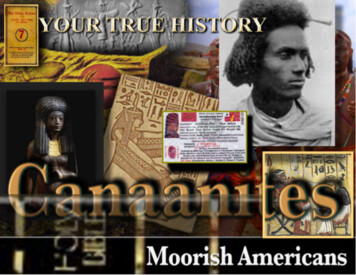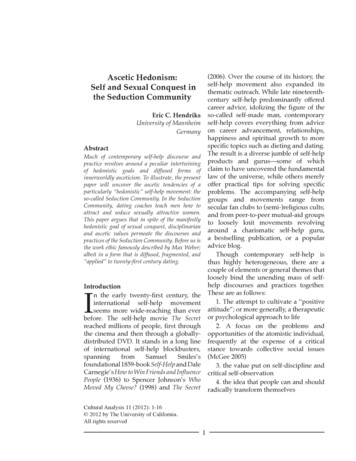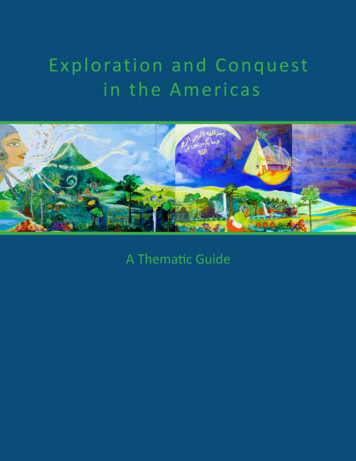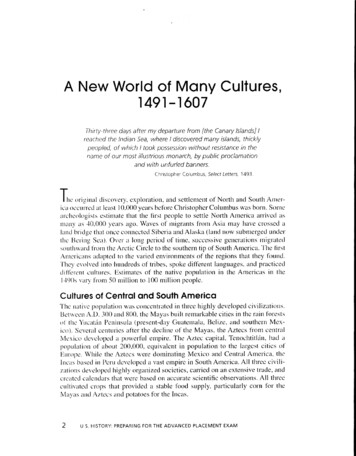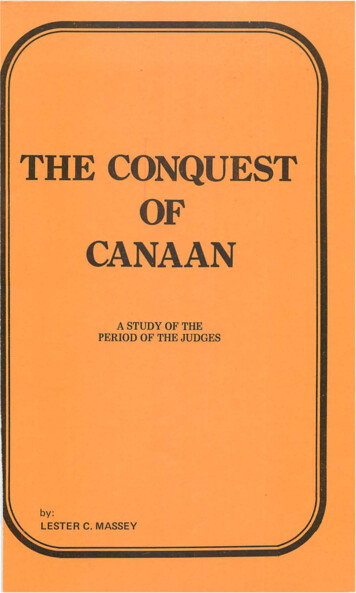
Transcription
THE CONQUESTOFCANAANA STUDY OF THEPERIOD OF THE JUDGESby :LESTER C. MASSEY
CONQUESTOFCANAAN*************A SIMPLE WORD PICTURE OF THE PERIOD OF OLDTESTAMENT HISTORY COVERED BY THE BOOKS OFJOSHUA, JUDGES AND RUTH BETTER KNOWN AS THEJUDGES.ORDER FROMLESTER C. MASSEY4702 Arrowhead TrailChattanooga, Tennessee 37411
CONTENTSCHAPTERPAGEJoshua - A Leader of People1IIJericho and Ai - A Test of Faith7IIIGibeon - The Folly of Deception14NGod's Power Vs. The Kings of Canaan17Division of the Land - God's Organization21An Introduction to the Book of Judges27A People in Need of a Leader30"The Sword of the Lord and of Gideon 1134Samson and the Philistines40Ruth - Mother of Kings47IvVIVIIVIIIIXx
PREFACEThe events of the desert wanderings of Israel are in all probability some of the most important happenings in human history.This period began a great migration of peoples that ended an oldcycle and inaugurated a new one. It came at an ideal time whenGreece and Egypt were relatively weak militarily, and the kingsof the cities of Canaan were warring among themselves, all ofwhich combined to make it an opportune time for Israel to moveinto the Land of Promise.The glorious conclusion of the story of the Exodus and the fortyyears of wandering saw Israel at the threshold of a challenging experience; an entirely new generation encamped on the east side ofJordan, ready to finally take possession of the land God had promised to Abraham centuries before. All of the previous generationwho were twenty years of age and older at the time of their rebellion against Moses at Kadesh-barnea, had died in the wilderness,with the exception of Moses, Joshua and Caleb. Before Mosesdied at the age of one hundred twenty years, he was permitted toview the land from the east side of Jordan on top of Mt. Nebo, buthe was not permitted to cross over into it because of his unbeliefat the waters of Meribah. (Num. 20:12) Moses had delegated hisleadership of the people of Israel to Joshua (Deut. 31:23), and thiswork covers the period which began with Joshua and his leadership of the people of Israel. From this time until the time Saulwas crowned King of Israel, there is recorded a most trying andyet a most challenging period in the history of Israel. This isknown as the period of the judges. During this time, and as longas Israel had competent leadership, they were willing to trust inGod, obey His commands, and enjoy His blessings; but their history is somewhat spotted, not only with times of trust, obedienceand blessings, but also with times of idolatry, disobedience andpunishment.In this work an attempt has been made to draw a simple wordpicture covering the books of Joshua, Judges and Ruth. The yearscovered by these three books stand out in Israel's history as amost trying period as the people attempted to overcome theirenemies and to adjust themselves to a new land and a new way oflife. No attempt has been made to cover the last two judges ofthis period, Eli and Samuel, since their history begins in FirstSamuel chapter one, and should be more profitably studied as abeginning point of the United Kingdom which ended with the deathof King Solomon.
Dates are very confusing, especially during their period, sincethe most learned of Bible scholars have consistently disagreed. Itmay be well to obsezve, however, that the Apostle Paul in speaking to the Jews in Antioch concerning this period of their history,said: 11 And after that He gave unto them judges about the spaceof four hundred and fifty years, until Samuel the prophet. 11 (Acts13:20) This is the only actual information: the scripture affordsconcerning the period of time covered by this work. Dates whichmay appear in any Bible as marginal notes are by man's computation only made over the past several centuries.There is one significant thought which comes to mind when astudy is made of this period of Bible history, and that is that Godcares for His own and is ever ready and willing to sustain them intimes of persecution and distress if they will only listen to Himand follow His commands. This study should encourage God speople in our day in their efforts to place their trust in the AlmightyGod and look to Him alone in their efforts to combat the forces ofevil which lie on every hand.Much has been written about the Patriarchs, the kings ofIsrael, their captivity, exile and return, but very little has beenwritten concerning the period of the judges. Therefore, the hopeand prayer of the author is that it will be a blessing to those whoscan these pages.At the end of each chapter is a list of topics for discussionwhich are pertinent to the subject matter and which may be ofassistance to any who may desire to use this book for classstudies. Every effort has been made to silJlplify the language sothat it may be used for class studies from teens to adults.The admonition and promise God gave to Joshua as he assumed the leadership of Israel, and launched the conquest of Canaan,is one which could well be heeded by the leaders of God's people in our day:"Only be thou strong and very courageous, that thou mayestobsezve to do according to all the law, which Moses mysezvant commanded thee: turn not from it to the right handnor to the left, that thou mayest prosper whithersoever thougoest. 11Joshua 1:7Chattanooga, Tennessee1977Lester C. Massey
CHAPTER IJOSHUA - A LEADER OF PEOPLE"Now after the death of Moses the servant of the Lord it camecame to pass that the Lord spake unto Joshua the son of Nun,Moses' minister, saying, Moses my sezvant is dead; now therefore arise, go over this Jordan, thou, and all this people, untothe land which I do give them, even to the children of Israel."(Josh. 1:1-2}These first two verses of the Book of Joshua are like a curtainopening upon the second act of a drama. The history of Israel hadbeen recorded in the Pentateuch from God's first promise toAbraham, approximately seven centuries through the lives of Isaacand Jacob, the servitude in Egypt, the Exodus and the wildernesswanderings. With the death of Moses the curtain falls upon thefirst period of Hebrew history. The next period of approximatelytwo hundred years was to be a period of conquest, bloodshed andtrial for this people. Yet through it all can be found the actualbirth of a nation of God's people.The authorship of the Book of Joshua is obscure. Some haveascribed it to Joshua himself, but there is reason to doubt that hewrote all of it. Some consider Samuel as the author and some evenEzra. However, there is every reason to believe that it was written sometime before the period of the United Kingdom. Everyactivity of the people of Israel and their conquest of Canaan isnot recorded, because it is evident that in finally occupying theentire land, it required the conquering of many more cities thanjust the ones mentioned in the text of the books of Joshua andJudges.The people of Israel were now a completely different generation from the one which had left Egypt forty years before, and theywere now face to face with the awesome challenge of taking possession of the land which God had repeatedly told them was theirs.Yet this land was occupied by nations who knew not the God ofIsrael and they were prepared to fight to retain their homes as wellas preserve their lives. They lived in walled cities for the mostpart, and had their fighting men to protect them. The only difference was that God was on the side of Israel, and He had promisedthem that He would help them take possession of the land. Hehad given them a strong and courageous leader in Joshua, and Hispromise was that they could possess every place that the sole oftheir foot should tread upon. What more could any people desire?-1-
From the beginning, God's people have required competentleadership, and He has always been willing to provide it just solong as they followed His instructions and would put their complete trust in Him and in the leadership which He provided. Inour twentieth century, one of the most urgent needs of God's peopleis qualified, competent leaders; men who will forget petty personalities and politics, and who will have sufficient vision along withthe ability to follow God's every command in leading His people.An elder, or shepherd of God's flock today must of course havethe scriptural qualifications before he can even occupy this highposition which, if he has, will be demonstrated in his naturalability to lead. He is a leader, not a driver nor a ruler. No onehas ever seen a shepherd driving a flock of sheep; he leads themand they follow him whithersoever he goes. Jesus taught thislesson very emphatically. (John 10:4-5) The lack of this properkind of leadership has been the cause of most of the problems inthe Lord's Church over the years.Joshua was God's selection for leading the Israelites in theirconquest of Canaan. (Deut. 31:23) It is certain that Joshua hadall the right qualities of leadership, because the first mention ofhim is when Moses chose him to lead the people in battle againstthe nomadic Amalekites at Rephidim when they attacked Israel inthe Wilderness of Zin. (Ex. 17:8-13) At that time God made apromise to utterly put out the remembrance of Amalek from underheaven. (Ex. 17:14) Several centuries later God commanded KingSaul to go and utterly destroy the Amalekites. (I Sam. 15: 1-3)The Amalekites continued to be bitter enemies of Israel even in thedays of the judges.Again Joshua is mentioned as one who accompanied Moses partof the way up Mt. Sinai when he received the first two tables ofstone, and was the first to meet him on his descent. (Ex. 32: 17)Soon afteiwards Joshua became one of the twelve spies sent to explore the land of Canaan, and he was one of the two who returnedwith an encouraging report. It 'was at this time that the peoplerebelled against Moses at Kadesh-barnea and ref used to enter theland of Canaan; but because Joshua and Caleb were the only twoof the spies who encouraged the people to enter at that time, theybecame the only two survivors who left Egypt at twenty years ofage or older who eventually came to the place where they couldlook across Jordan and view the land of promise which God described as flowing with milk and honey. It was here that God directed Moses, shortly before his death, to invest Joshua solemnly and publicly with definite authority over the people along withEleazar the Priest.-2-
God knew Joshua s capabilities, just as He knew Moses' ability many years before when He appeared to Moses in Midian onthe back side of the desert and directed him back to Egypt to deliver His people from bondage. God even today recognizes thecapabilities and talents of those in His Church who can be leaders. The tragedy is that there are so many who could be leaderssuch as elders, deacons, preachers or teachers, who are notwilling to use their abilities in His sezvice. Joshua was not thistype of man. The first nine verses of Joshua chapter one contains God's marching orders for him, and there was no way hecould misunderstand his duty to God and the people, nor the abundant blessings which would follow if he conducted himself according to God's ·instructions. God said He would give them "everyplace that the sole of your foot shall tread upon. 11 (Josh. 1:3)And again, "There shall not any man be able to stand before theeall the days of thy life. 11 (Josh. 1:5) And again, "Only be thoustrong and very courageous, that thou mayest observe to do according to ali the law -- turn not from it to the right hand or tothe left, that thou mayest prosper whithersoever thou goest. 11(Josh. 1:7) .These first nine verses of Joshua chapter one set thepace for him in the years ahead and Joshua, along with Moses,carved his name in the eternal hall of fame as one of the greatestleaders of people the world has ever known.The success of any great leader is in direct proportion to therespect he demands of the people he is leading and in their willingness to follow, not because of fear, but because they trusttheir leader, they respect his judgments and they are willing tofollow him gladly. This is demonstrated vividly in Joshua s dealings with three of the tribes who wanted to settle on the easternside of Jordan. Before Moses died, he had promised the tribes ofReuben, Gad and half the tribe of Manasseh that they could settlethere rather than on the western side usually referred to as Canaan.Now Joshua concurred in Moses decision, but he demanded thatthey take their fighting men across Jordan with the rest of thepeople until they had conquered all the land, after which theycould return to their wives, their little ones and their cattle.·(Josh. 1:12-15) They promised Joshua that they would do all ashe commanded, and in chapter four and verse thirteen it is notedthat about forty thousand fighting men of these three tribes crossed Jordan with the others. This incident demonstrates Joshua'sexceptional qualities of leadership in resolving a matter whichcould have been a touchy problem. This incident also points up amost significant thought, and that is that Joshua required all ofthe people to become involved in the work that had to be done.Qualified leaders in the Lord's Church of our day will see to it-3-
that all are involved in the work of the Church, and that no amountof talent and ability in the congregation will be allowed to liedormant.Joshua also demonstrated his strategic wisdom when he sentthe two spies to explore Jericho even before they crossed theJordan. The leader of any army needs to know the strength of theenemy in order to know what kind of tactics he can use to overcome them. He knew that Jericho was a city which could not beeasily taken even though he knew God had promised to be with himand help him overcome all obstacles. Yet he wanted to knowsomething about the enemy against whom he was to march. Eventhough God today promises His people that he will be with themall the way, at the same time it is most important that they knowthe powers of Satan, and the methods he uses before they cansuccessfully overcome present day obstacles.It is a familiar story to any Bible student how Rahab receivedthe spies and protected them from the king of Jericho, and eventually made it possible for them to escape with a promise that whenthe city was taken by the Israelites, she and her family would bespared. After successfully escaping, the spies hid in the mountain for three days before they reported to Joshua what had befallenthem. One of the things they learned was that "All of the inhabitants of the land do faint because of us. 11 (Josh. 2 :24) Would itnot be wonderlul if all those in the world today who profess tofollow Christ would work together as one solid phalanx againstthe works of evil in the world to such an extent that Satan and hisforces would "faint because of us"?Of. course, Joshua s first problem was to get the people ofIsrael on the other side of the Jordan. God gave him explicit instructions for this operation and Joshua followed them to theletter. First the priests bearing the ark of the covenant came tothe brink of the waters, the people remaining behind a space oftwo thousand cubits (somewhat over a half mile) . Then when thesoles of the priests touched the water, all of the water of theriver from above them stood up as a wall and all of the water below "failed even to the Salt Sea." (Josh. 3:16) The priests whobore the ark stood in the middle of Jordan on dry ground while allthe people passed over on the other side. Joshua had twelvestones taken from the spot where the priests were standing, onestone for each of the twelve tribes, and built a memorial to remindposterity that God had stopped the river Jordan in a miraculousway and allowed the people to cross without any problems. (Josh.4: 9) When the priests came up out of the river bearing the ark,-4-
the water returned to its place, even overflowing its banks as itwas before they crossed. {Josh. 4: 18)When they reached the other side of Jordan, the first thing Godcommanded Joshua was to circumcise every male according to thelaw. It must be remembered that this was a new generation, andthat all those twenty years of age and older who came out of Egyptdied in the wilderness, and they did not circumcise those whowere born during the forty years of wilderness wandering. {Josh.5:2-5) They observed the Feast of the Passover on the fourteenthday of the month in the plains of Jericho, and they ate of the cornof the land the self same day. On the morrow, the manna ceased,and the place was called Gilgal. {Josh. 5:9)Joshua was a young man when he left Egypt {Ex. 33:11) and ithas been estimated that he was about seventy years of age whenhe succeeded Moses as leader of the twelve tribes of Israel. Hewas the son of Nun, a member of the tribe of Ephraim, and a rulerwithin his tribe {Num. 13:2), and his complete lineage fromEphraim is recorded in I Chron. 7:20-27.And so God's chosen Israel, under the expert leadership ofJoshua, began one of the most challenging periods of their history.During the conquest of Canaan oftentimes the people would waver,commit sin, or otherwise incur God's displeasure, but as long asJoshua lived he never lost sight of God nor of his responsibilityas a leader of God's people. He was consistently and continuallystrong and of good courage as God had commanded him. But, ofcourse, that was the terms upon which God had predicated Hisblessings when he was commissioned as leader of the people.God had chosen this people to be His own, to nurture and blessthem as long as they chose to be faithful; but He could not anddid not tolerate disobedience, nor rebellion, nor any transgressionof His command. He had a purpose in choosing Israel as He did,and He had the right of sovereign authority over them, both as individuals and as a nation. It was His purpose to mold a nationof people through whom eventually He could bring a Messiah intothe world, a promise which goes all the way back to the time whenHe drove Adam and Eve out of the paradise of Eden. {Gen. 3: 15)However, God could not mold this nation in the same way a potterwould mold a vessel of clay. He was dealing with individualswho made up a nation, and He could not create holiness in themby a mere act of power. He could only produce holiness in themin a manner consistent with the moral agency of man. Even today,God bestows His favors not to compel man, but by His promises-5-
and His blessings He inclines men to exert their own will andin so doing, be willing to follow through their own desires andthereby receive His blessings. God does not by any directpower make people either good or bad, but He continuallypleads with them through His word to hear, obey and be blessed in so doing. It is true that through the centuries God hasused wicked men to carry out His plans, such as Pharoah inMoses' day, but God did not make him wicked; it was by hisown choice that he ref used to see the power of God, and soGod used him to implement His plan. This is the manner inwhich God has dealt with man even from creation.Now as Israel is encamped at Gilgal, they find thems0lvesface to face with a challenge to either follow Joshua's command, be faithful, obedient, strong and of good courage so asto possess the land which.was theirs, or else be afraid, rebel,refuse to accept that which God had promised to Abraham andMoses and return to the land from whence they came. Theychose the good way and proceeded on towards Jericho, notknowing as yet how they would be able to overthrow such afortified city.As a study of this period from Joshua through Judges is pursued, a most intriguing account is given of Israel's willingnessto accept this challenge which involved conquering and drivingout the heathen occupants of the land, which they knew not,and adjusting themselves to a new land which was fruitful andproductive, a kind of land they had not known before in theirlives. And now they are about to go forth and demonstrate toGod a
the most learned of Bible scholars have consistently disagreed. It may be well to obsezve, however, that the Apostle Paul in speak ing to the Jews in Antioch concerning this period of their history, said: 11And after that He gave unto them judges about the space of four hu





